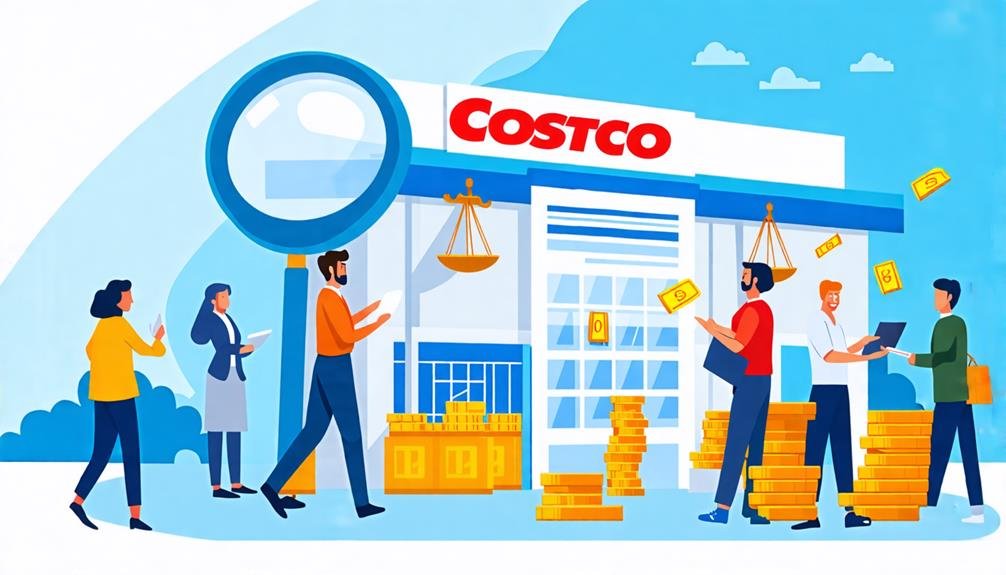Costco is currently embroiled in a class action lawsuit centered on allegations of opaque pricing practices. Shoppers claim they experience significant price differences between online and in-store purchases, with insufficient transparency regarding these discrepancies. A notable case involved toilet paper, where customers felt misled about costs. This situation poses a threat to Costco's reputation, as clear pricing is essential for consumer trust. As consumers increasingly prefer online shopping, the push for transparency in pricing has never been more imperative. Stay tuned to uncover more insights on how this lawsuit might reshape pricing practices in the retail landscape.
Overview of the Lawsuit
A class action lawsuit has been initiated against Costco, alleging a lack of transparency regarding price variations between its online and physical retail locations. This legal challenge emphasizes concerns about Costco's pricing strategies, with claimants asserting that consumers are misled by inconsistencies that can result in higher costs for identical products purchased online. The plaintiffs contend that this ambiguity provides Costco with an unfair edge over rivals that offer clearer pricing details.
In recent developments, plaintiff Annie Song has emerged as the prominent figure in this lawsuit, claiming she overpaid for goods due to insufficient communication about potentially lower in-store prices. For instance, she purchased Charmin toilet paper online for $33.49, while the same item was priced at $29.99 at her nearby Costco warehouse. This scenario raises important issues regarding how online retailers manage convenience alongside equitable pricing.
As the proceedings progress, this case may spark a wider conversation on pricing transparency in e-commerce. Consumers deserve access to the best available value, and this lawsuit could potentially influence expectations for online pricing practices, not only at Costco but throughout the retail sector.
Allegations Against Costco
The lawsuit against Costco centers on claims that the wholesale retailer lacks sufficient transparency regarding price discrepancies between its online store and physical locations. Plaintiff Annie Song argues that Costco does not consistently inform shoppers about potentially lower prices available in-store. This alleged omission could mislead consumers, potentially giving Costco an unfair market advantage. While the company does provide a disclaimer about possible price differences due to delivery fees and shipping costs, critics assert that such notices are not always clearly visible.
The legal action highlights concerns about how Costco's online pricing strategies compare to those of competitors who are more transparent with their price comparisons. For consumers who prioritize clarity, this issue could be crucial. They expect fair treatment and clear visibility into the best deals. As the case progresses, many are curious about its potential effects on Costco's reputation and online shopping experience. The outcome may redefine expectations for pricing transparency, encouraging retailers to reconsider their communication practices and build trust with their customers.
Case Study: Toilet Paper Pricing

Annie Song's experience with purchasing Charmin toilet paper online highlights a crucial issue of price transparency in Costco's pricing methods. Song claims she paid $33.49 for a product that her local Costco warehouse offered for $29.99. This price difference raises important questions: Should shoppers be made aware of lower in-store prices when they buy online?
The lawsuit asserts that Costco did not adequately inform customers about these price variations, leaving consumers like Song feeling deceived and frustrated. Price transparency is vital for building consumer trust and enabling individuals to make informed decisions. By not clearly displaying potential lower in-store prices, Costco might create an unfair advantage over rivals who emphasize clear pricing communication.
As shoppers increasingly prefer online purchasing, they deserve access to accurate pricing information. This case underscores the importance of transparency in retail practices, urging businesses to reassess their pricing approaches. In a landscape where knowledge equates to power, consumers should feel assured in their buying decisions, confident that they are receiving fair and transparent pricing—whether online or in physical stores.
Online Shopping Convenience
Concerns about price clarity exist, but the ease of shopping on Costco's website attracts many members who struggle to visit a physical warehouse. The ability to purchase items from home offers significant advantages, especially for individuals with hectic lifestyles or mobility challenges. Here are several reasons why online shopping at Costco appeals to members:
- Time-saving: Internet shopping reduces the hassle of navigating crowded aisles, enabling members to locate their desired products quickly.
- Accessibility: For those without convenient access to a warehouse location, Costco's online platform serves as a vital resource for exploring its vast product selection.
- Flexible shopping hours: Members have the freedom to shop whenever it fits their schedules, moving beyond conventional store hours.
While some may incur higher costs for the ease of online transactions, many find the trade-off worthwhile. This flexibility in shopping aligns with the preferences of contemporary consumers, who prioritize accessibility and efficient time use. Consequently, despite ongoing conversations about price clarity, the appeal of online shopping continues to draw Costco members seeking a streamlined experience.
Impact on Costco's Reputation

The ongoing legal dispute involving Costco's online pricing practices threatens the wholesaler's public image, especially in today's competitive e-commerce environment. As shoppers become more selective, clarity in pricing is crucial for fostering trust and loyalty. The claims suggest that Costco's online pricing could lack transparency, which may raise concerns among current and potential customers.
In a time when information is easily accessible, consumers often prefer retailers that emphasize honesty and fairness. If Costco does not effectively address these allegations, it risks facing a backlash that might lead customers to avoid its online services. Rivals like Amazon and Walmart, who openly share their pricing structures, could gain a competitive edge by being perceived as more reliable options.
Additionally, the lawsuit highlights the significance of communication in the online marketplace. In a landscape where consumers desire freedom in their purchasing decisions, brands like Costco need to evolve and ensure that their pricing methods meet customer expectations. Taking proactive steps to resolve these issues could help Costco maintain its reputation and reinforce its commitment to customer satisfaction over time.
Community Reactions
Costco members on Reddit reacted to the lawsuit with a blend of surprise and skepticism about the retailer's online pricing transparency. Many users expressed astonishment at the allegations, sharing personal experiences with Costco's website.
Several key points emerged from the discussion:
- Awareness of Disclaimers: Many users noted the visibility of disclaimers that indicate potential lower in-store prices, suggesting that this information was not hidden.
- Value of Convenience: Shoppers acknowledged that the ease of online shopping often makes slight price increases acceptable, enhancing the appeal of the online experience despite pricing inconsistencies.
- Critical Thinking: Some community members stressed the need to carefully evaluate prices, encouraging others to compare online and in-store deals before making purchases.
This range of perspectives highlights a broader dialogue about consumer rights and expectations in the digital marketplace. While some members sympathize with the plaintiff's issues, others value the trade-off between convenience and cost. Ultimately, this lawsuit has ignited an important conversation about pricing transparency and the ethical obligations of retailers in a predominantly online shopping environment.
Importance of Pricing Transparency

Pricing transparency is essential for building consumer trust and ensuring fair competition among retailers, particularly in the bustling online shopping sector. In a marketplace filled with options, shoppers need to understand what they are paying for and the reasons behind the prices. Clear pricing empowers consumers, allowing them to make informed decisions and enhancing their independence as buyers.
When major retailers, such as Costco, fail to effectively communicate price differences, they mislead shoppers and create disparities in the market. Customers may feel cheated, leading them to question their loyalty to a brand that lacks integrity in its pricing practices. Recent claims against Costco underscore the urgent need for transparency, pushing businesses to reveal potential price differences between their online and physical store offerings.
Furthermore, transparent pricing can strengthen customer loyalty. When consumers perceive fairness in pricing, they are more inclined to return, nurturing a positive relationship between retailers and their customers. As the online shopping environment continues to change, adopting transparency is not merely a best practice; it is a crucial strategy for thriving in this landscape. In today's digital world, clarity in pricing is more than a necessity; it is a fundamental right for every consumer seeking freedom in their purchasing decisions.









